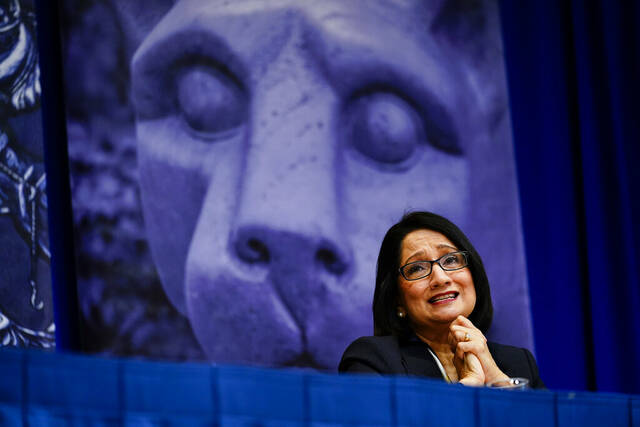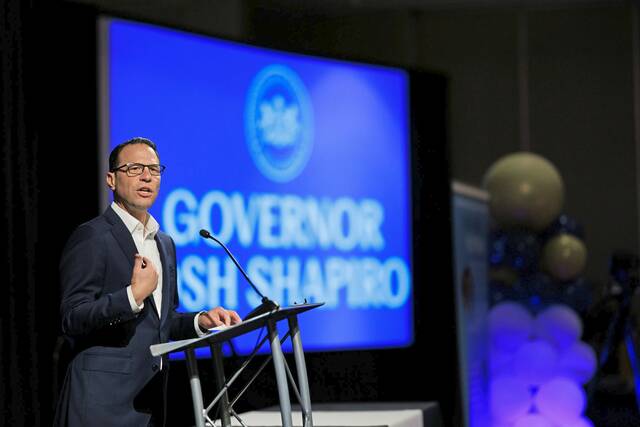HARRISBURG — With a new governor and newly-seated Legislature to hear it, Penn State President Neeli Bendapudi made a pitch for more state aid for Penn State, in particular, and higher education generally in remarks Monday before the Pennsylvania Press Club.
Now seven months into her tenure as president and advocate-in-chief for Pennsylvania’s largest university, Bendapudi is coming in hot with a request for a 47 percent increase, or an additional $115 million, in the state’s annual subsidy to Penn State’s operating budget.
Penn State is receiving $242 million in general support in the current budget year.
Her rationale for the big increase?
Penn State has been making the case that its current level of state aid, on a per-student basis, is far lower than the state’s allocations to the University of Pittsburgh and Temple, the other two major state-related universities.
A report to university trustees last year showed current state funding per Pennsylvania resident undergraduate at Penn State is $5,608.
The next-highest per-student subsidy, in a comparison with Pitt, Temple, and the 14-school Pennsylvania State System of Higher Education, is the $8,275-per-student allocation received by Temple. According to the data, the 14 PASSHE schools, in the aggregate, receive $8,378 per in-state undergraduate, and Pitt receives $9,049 per in-state undergraduate student.
“I would just say in any kind of work, if there were competitors and you got fifty to sixty percent less compared to the others next to you, that does put you at a disadvantage,” Bendapudi told her midday audience at the Hilton Harrisburg.
“That really hampers us in our mission of access and affordability.”
Arguing that Penn State’s and Pennsylvania’s well-being are entirely intertwined, Bendapudi said Monday that in return for an amped-up state investment, she will happily is be held accountable for Penn State’s progress in areas including:
- Keeping tuition costs low so entry into Penn State remains accessible to all; and making targeted investments in staff and faculty and facilities so that the quality of the education those students are getting stays high.
- Closing gaps in graduation rates between students of different racial and economic backgrounds: “Any category where we see huge disparities in graduation rates, that is a travesty that we must address,” Bendapudi said, “because when a student starts college and drops out without finishing their degree, they are worse off than if they hadn’t started.”
- Helping to drive Pennsylvania’s next-generation economy through research, launch pads for the creation of new businesses, and development of a high-caliber workforce to fill existing jobs and helping to make Pennsylvania increasingly attractive to new employers who aren’t here yet.
“I hope I’ve given you some thoughts to consider why what is good for Pennsylvania will always be good for Penn State,” the one-time marketing professor said, “and I hope you will see that what is good for Penn State is also good for Pennsylvania.”
The university, in its formal request for a 2023-24 appropriation, has asked the Legislature and now-Gov. Josh Shapiro to address the situation by raising Penn State’s aid appropriation, on a per-student basis, to at least the level that Temple receives.
This expanded request comes at a time of some major financial challenges for Penn State.
The university’s final operating budget for 2022-23, approved in September, showed a projected deficit of about $140 million for university operations, which university officials have blamed in part on pandemic-related revenue drops, efforts under former President Eric Barron to tightly control tuition rates, small student enrollment declines and last year’s spike in inflation rates.
Bendapudi, who became Penn State 19th president in May after serving as president of the University of Louisville since 2018, also put in a word for stronger state support for higher education generally.
“Because when you think about the jobs of the future, and competition, college has to be part and parcel of that. Not the only answer; I’ve never said that it is. But it has to be a part of how we attract and retain the jobs of tomorrow,” Bendapudi said.
In a brief open question session after her address, Bendapudi:
- Defended her much-criticized decision to cancel the opening of a Center for Racial Justice at Penn State.
She argued Penn State already knows what it needs to do to address these issues on its campuses, “and I believe what we really need to do is hold ourselves accountable for the outcomes.”
Bendapudi promised the creation of a public-facing dashboard to show how students and staff from different constituencies are being served with barometers like retention of students of color and diversity of faculty.
- At a time when some of Pennsylvania’s 14 state-owned universities are struggling to attract students, Bendapudi said her administration will continue to be aggressive in recruiting students to Penn State’s 19 Commonwealth campuses, which she said she sees as an important part of its land grant mission to serve the entire state, including traditional and non-traditional students.
She noted the campuses give a legitimate commuter option for students who are cost-sensitive, and also have developed sought-after niches of expertise citing, to name a few, Altoona’s railroad engineering program, Mont Alto’s forestry curricula and Behrend’s work in plastics.
“These (campuses) are legitimately gems in their own right,” Bendapudi said.
On a lighter note, Bendapudi was asked if, after this year’s trial run, she expects beer will continue to be sold to all age-eligible fans at home football games.
“I have heard nothing to the contrary,” Bendapudi said.








